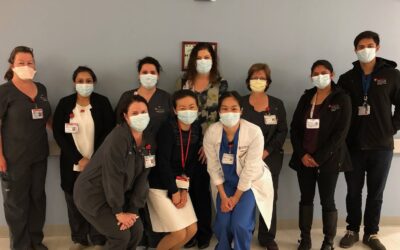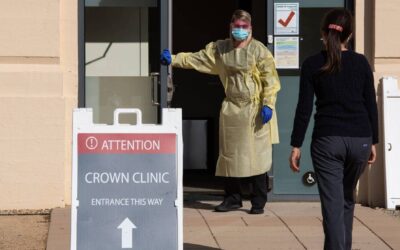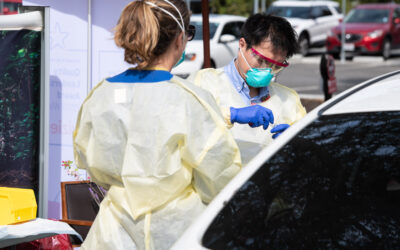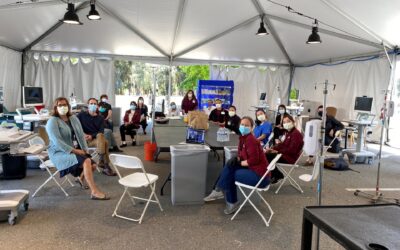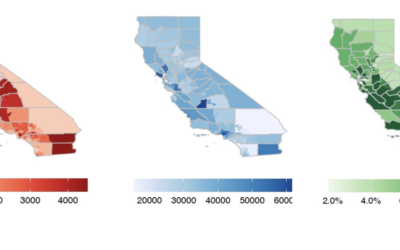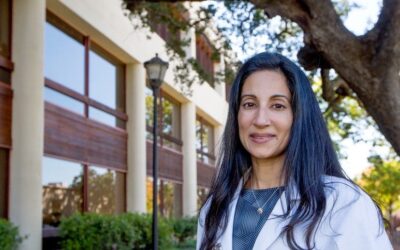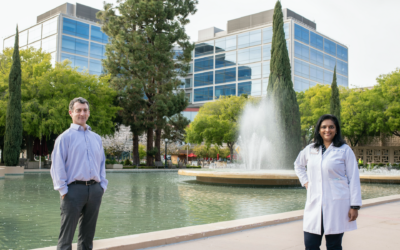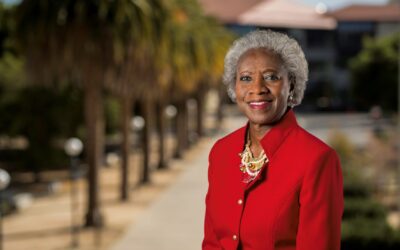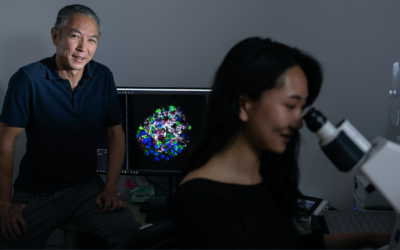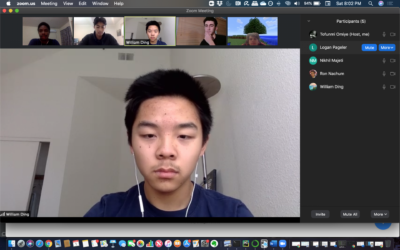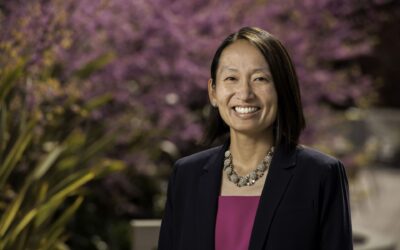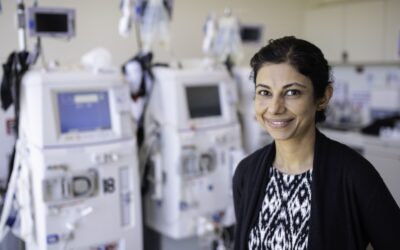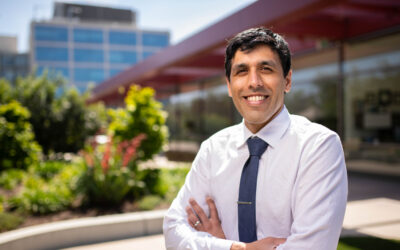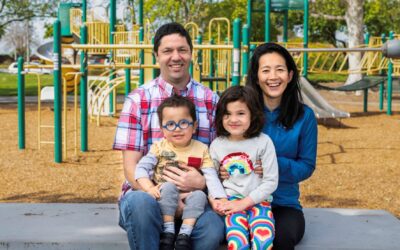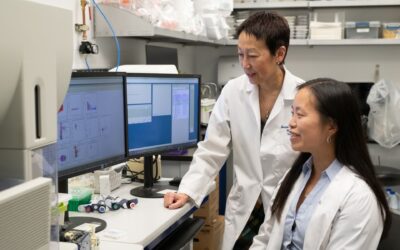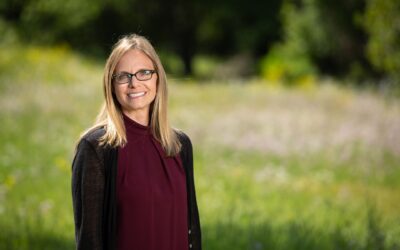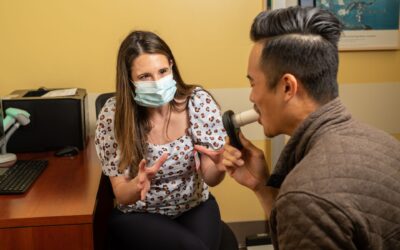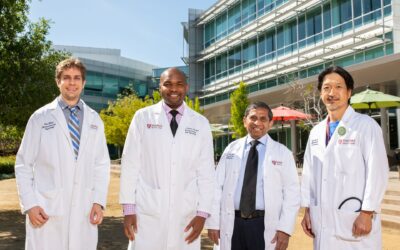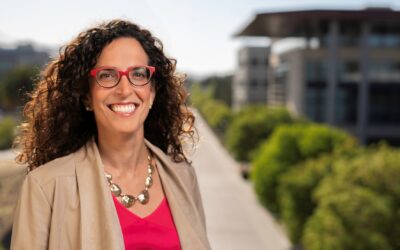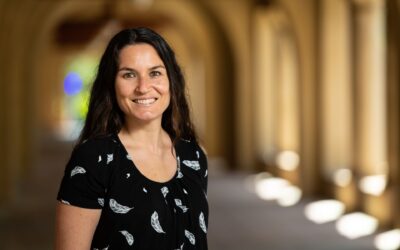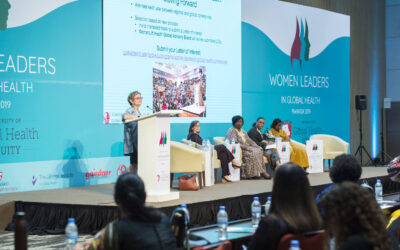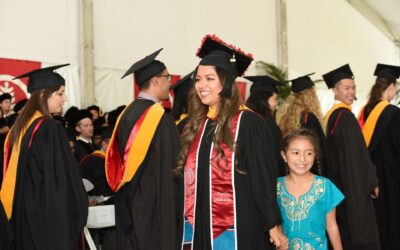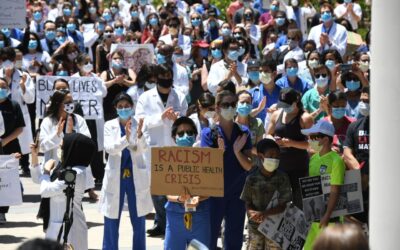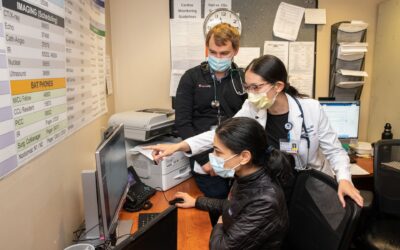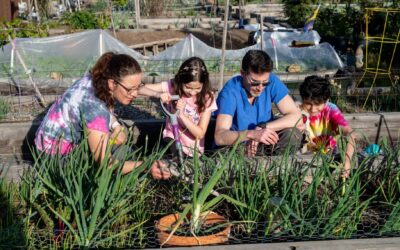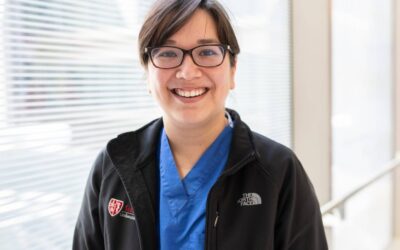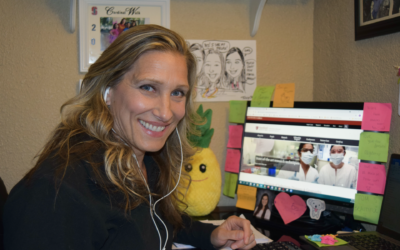
2021 Annual Report
Meeting the Moment
Annual Report 2021 Welcome Video
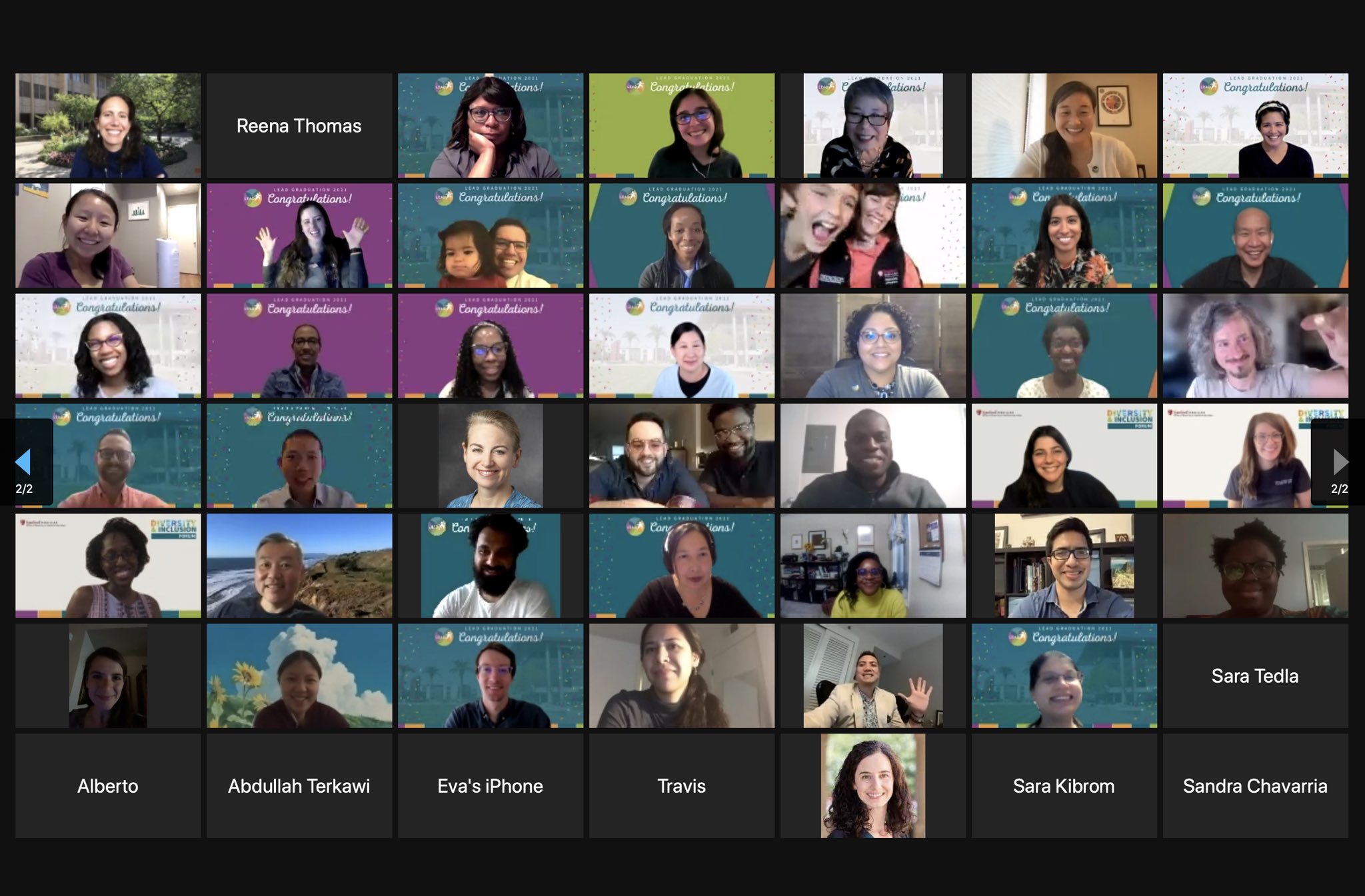
What's Inside
Caring for COVID-19 Patients: Department of Medicine Comes Together to Serve Community Impacted by COVID-19
Throughout the coronavirus pandemic, Department of Medicine staff put in long hours treating patients from their community and beyond. It was an experience that will forever shape the training of residents and fellows from “the COVID-19 generation.”
A Dedicated Clinic for COVID-19 Patients
Stanford Express Care’s CROWN clinic was designed to provide care for patients who test positive for coronavirus but don’t require hospitalization.
Stanford Lends a Hand
From grocery runs to online fundraisers, the Department of Medicine community found ways to help others amid the coronavirus pandemic.
A COVID Trial Pitches a Tent in the Great Outdoors
When you think of advanced clinical trials, you usually don’t think of a tent. But that’s where you’d be wrong—in April 2020, when COVID felt new and every breath was terrifying, a tent was just what the doctor ordered.
COVID-19 Modeling Team at Forefront of Pandemic Projections and Planning
A Stanford team uses simulation models for California’s public health and prison systems, as well as hospitals and health care providers to plan for and mitigate the impact of the pandemic.
It’s Been a Busy Year for Hospital Medicine
In the midst of the COVID-19 pandemic, frontline hospitalists devised protocols and checklists that ultimately saved time and lives. Despite multiple consecutive weeks of bedside care, the division’s physicians continued teaching medical students and residents and took on several new activities: COVID-19-related clinical trials at Stanford Hospital and ValleyCare and using artificial intelligence to aid in caring for dying patients.
Infectious Diseases and Hospital Medicine Act Swiftly to Launch Clinical Trials for Remdesivir
Clinical trials at Stanford and other sites yielded convincing data that led to FDA authorization of remdesivir, which remains the standard of care for hospitalized patients with COVID-19. Department of Medicine researchers were actively involved in those trials.
Team Science Initiatives Aim to Investigate ‘Long-Haul COVID’
Two multidisciplinary groups are collaborating across fields to understand the constellation of long-term symptoms that can arise following COVID-19 infection and find out who is at risk.
Lung Organoids: A Novel Way to Model COVID Infection
Stanford researchers model COVID infections using newly-developed miniature lung organs in a petri dish to better understand the virus and test potential treatments.
Biomedical Informatics Research: High Schoolers Show How Data Analysis Can Shape Public Health Policy
In the midst of the pandemic, a broad assignment from professor of biomedical informatics Nigam Shah, MBBS, PhD, led to an impactful connection among five strangers from different parts of the world. Their research showed that policy decisions allowing for the reopening of restaurants/bars and houses of worship correlated with the most significant spikes in hospitalization cases.
Talented Women at Every Level of Nephrology
A glance at the website for the division of nephrology brings a short paragraph into focus. It includes these three sentences, which could easily be considered a vision statement: “We are devoted to training the next generation of nephrologists in a supportive...
One Company’s Trash: Nephrology’s Collaboration With Industry in the Fight Against COVID-19
Ascend Clinical CEO Paul Beyer and Glenn Chertow, MD, met on a windy afternoon in early spring 2020, when COVID-19 was first starting to surge in New York. Both felt powerless and wanted to help fight COVID-19 with the resources at their disposal. Their thoughts turned quickly to the remnant patient samples Ascend had access to, and the possibility of testing those for COVID antibodies.
Systemic Sclerosis: A Rare Disease That Requires Several Specialists
Systemic sclerosis, an autoimmune disease, is the clinical interest of professor of immunology and rheumatology Lorinda Chung, MD, MS. Because the disease attacks so many bodily systems, its care requires the attention of experts in many medical and surgical specialties.
Fine-Tuning Medications for Stronger Veteran Hearts
In a pilot study, cardiologists worked with pharmacists to adjust VA heart failure patients’ medications to reach the optimum dosages that support better, longer lives.
Personal Experience Motivates Tian Zhang’s Work With AML Patients
After learning that her young child had an exceptionally rare genetic disorder, this physician-scientist recommitted herself to working on another rare disease – acute myeloid leukemia, or AML.
Innovative Antibody Treatment Proves Safe and Effective for Immune Disorders
A novel targeted antibody treatment clears the way for successful blood stem cell transplants, demonstrating no side effects when treating infants through older adults with immune disorders in Stanford’s clinical trials.
‘Born to Be Bad’: Cancer Researcher Christina Curtis Presses for Answers on the Origins of Tumors
What does it take for a tumor to develop? How can it be intercepted earlier? Cancer researcher Christina Curtis is pressing for answers, and they can’t come soon enough.
Eliminating the ‘Chronic’ from COPD
Clinicians and researchers are exploring new ways to diagnose and manage chronic obstructive pulmonary disease before it has a chance to inflict its irreversible damage on the lungs. A simple in-office test can help in early detection.
Gastroenterology and Primary Care Partner to Improve Access and Outcomes for Patients
A new partnership between primary care physicians and the division of gastroenterology is working to shorten the wait time for patients who need to see a gastroenterologist. This improved access is likely to improve patient outcomes as well.
The Student Guidance Program: A Road Map to Success
Very soon after deciding that her passion was for medical education, assistant professor of endocrinology Danit Ariel, MD, MS, found her niche. Designer and director of the SGP since 2016, she coaches and mentors medical students one-on-one, guiding them to improve their clinical skills.
Health Economist: We Need More Women in the Field
The field influences so much public health policy, so medical economist Maya Rossin-Slater mentors other early career women economists.
The Center for Innovation in Global Health Challenges the Global Health Status Quo With WomenLift Health
Despite comprising 70% of the global health workforce, women hold only 25% of leadership positions. Michele Barry, MD, is taking this issue head on with WomenLift Health, a new initiative from the Center for Innovation in Global Health that is propelling women in health around the world past the barriers that have historically held them back.
Diversity Is Central to Master’s Degree in Community Health and Prevention Program
Preparing students for health-related careers focusing on chronic disease prevention, health and wellness promotion, and the pursuit of health equity is the goal of this master’s program. Having a diverse group of candidates adds to its early success.
An Everyday Practice: Creating a Culture of Belonging to Transform Health Care
What happens when moments lead to a movement that changes what it means to be in community, be connected, and belong? After last year’s historic racial reckoning and #BLM protests, the Department of Medicine responded by appointing new diversity chairs, lifting up the personal stories of staff members, and reshaping its priorities and culture to address diversity, equity, and inclusion.
Addressing Health Care Inequities
Three innovative programs demonstrate Stanford’s longstanding commitment to diversity, equity, inclusion, and justice in health care. They are focused on developing evidence-based strategies for increasing equity in teaching and practicing medicine.
Meet the Beckers
The Beckers met for the first time twice: once in a university hallway, after Laren’s med school interview and before Nielsen’s, and then again just a few months later, at the first histology class for new MD/PhD students at Albert Einstein College of Medicine in the Bronx. Now they’re married and on the faculty in the gastroenterology division of Stanford’s Department of Medicine.
A Cardiology Fellow With an Interest in Heart Transplant … and Videography
An award-winning cardiology fellow, Leila Yeh Beach, MD, will pursue heart transplant medicine in a fourth year of fellowship. In her spare time, she created a well-regarded video currently being used to attract new recruits to Stanford’s cardiovascular fellowship training program.
Lost and Found
Three Department of Medicine staff members reflect on a year of working remotely – sharing their struggles and the moments that buoyed them.

